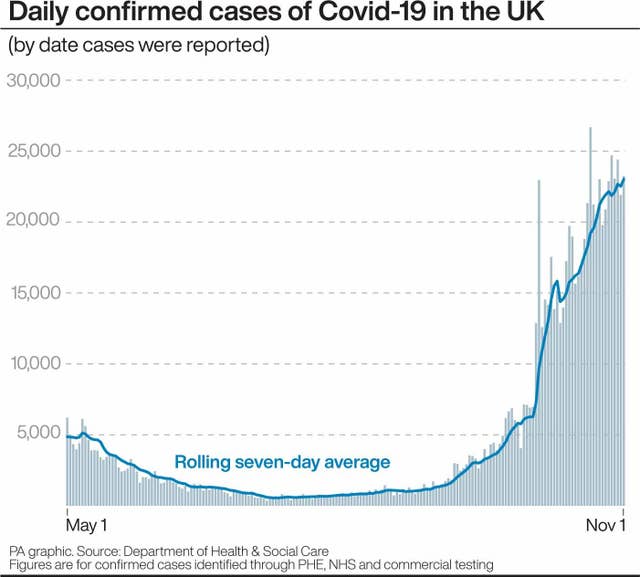Earlier lockdown would have saved thousands of lives, says scientist
Professor Andrew Hayward said: ‘I think if we had chosen a two-week circuit-break at that time, we would definitely have saved thousands of lives’.

Thousands of lives would have been saved if Boris Johnson had imposed a short lockdown when experts recommended it in September, a scientist advising the Government’s coronavirus response has said.
Professor Andrew Hayward said the move would also have “inflicted substantially less damage” to the economy than the new national lockdown for England, which will be imposed on Thursday.
Chancellor Rishi Sunak said it is his “expectation and firm hope” that England will exit the second shutdown on December 2, but ministers are unable to guarantee that.
The Prime Minister will use a statement in the Commons later on Monday to say that “we will seek” to ease restrictions back into the local tiered system next month.
And he will warn that Covid-19 deaths over the winter could be twice as high as during the first wave without the move, with several senior Conservatives likely to rebel against the Government.
There is anger over the severity of the restrictions, the length they will be needed for and over the delay to imposing them.
The Scientific Advisory Group for Emergencies (Sage) recommended on September 21 that a shorter “circuit-breaker” lockdown was needed.
Prof Hayward, who sits on the Government’s New and Emerging Respiratory Virus Threats Advisory Group, which works with Sage, acknowledged “we can’t turn back the clock” on imposing restrictions.
“But I think if we had chosen a two-week circuit-break at that time, we would definitely have saved thousands of lives,” he told BBC Radio 4’s Today programme.
“And we would clearly have inflicted substantially less damage on our economy than the proposed four-week lockdown will do.”
Meanwhile, Mr Sunak said that he appreciated “everyone’s frustration” but assured MPs that the lockdown will “as a matter of law” expire on December 2.
“Our expectation and firm hope is, on the basis of everything we know today, the measures we put in place for the time they are going to be put in place for will be sufficient to do the job we need. And we will seek to exit these restrictions back into a tiered approach at the end of the four-week period,” he told Today.
Mr Sunak, who has extended the furlough scheme across the UK throughout the second lockdown, also said there would be an increase in support in grants for the self-employed.
He said “directionally of travel” they will increase from 40% of profits but said the full details would be announced in Parliament by Mr Johnson.

The Prime Minister pulled out of a speech to business leaders at the CBI conference and will instead address MPs over the lockdown that will close pubs, restaurants and non-essential retail, while schools, colleges and nurseries can stay open.
People will also be allowed to exercise and socialise in outdoor public spaces with their household or one other person.
Facing growing unrest on the Tory backbenches, Mr Johnson is expected to say there is “no alternative” but to take national action.
“Models of our scientists suggest that unless we act now, we could see deaths over the winter that are twice as bad or more compared with the first wave,” he is to add.
“At the end of four weeks, on Wednesday December 2, we will seek to ease restrictions, going back into the tiered system on a local and regional basis according to the latest data and trends.”
MPs will debate and vote on the new measures on Wednesday but any Conservative rebellion is likely to be only symbolic with Labour poised to back the Government on the measures.
But opposition leader Sir Keir Starmer warned of the “human cost” of the Government’s inaction, with the daily death toll having increased since Labour called for a circuit-breaker last month.
Sir Keir told the CBI conference: “Make no mistake, the Chancellor’s name is all over this.
“His decision to block a circuit-breaker, to dismiss it as a ‘blunt instrument’ and to pretend that you can protect the economy without controlling the virus will now mean that businesses have to close for longer, more people will lose their jobs, and the public finances will be worse than they needed to be.”
Downing Street attempted to head off a rebellion by guaranteeing MPs a further vote “on the proposed way forward” when restrictions expire on December 2 after Cabinet Office minister Michael Gove raised concerns over the weekend when he said the national lockdown may need to be extended.
Conservative former Cabinet minister Esther McVey said she would vote against the four-week lockdown because the “‘lockdown cure’ is causing more harm than Covid”.
And Sir Graham Brady, the influential chair of the Tories’ 1922 Committee, said: “If these kinds of measures were being taken in any totalitarian country around the world, we would be denouncing it as a form of evil.”
In other developments:
– A further 23,254 people tested positive for coronavirus as of Sunday, while another 162 deaths were reported in the UK.
– Wales will introduce new national measures when its 17-day firebreak lockdown ends but will permit two households to meet at home if they form a “bubble”.
– Scotland moved to a new five-tier level of restrictions on Monday, as First Minister Nicola Sturgeon warned she would not hesitate to increase the level of protection either locally or nationally if required.
– Schools in Northern Ireland reopened on Monday after an extended half-term holiday, though other lockdown restrictions will remain in place until November 13.





